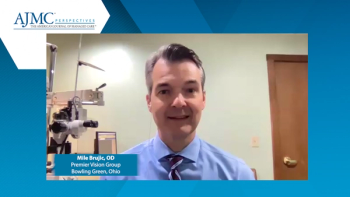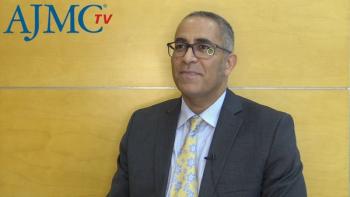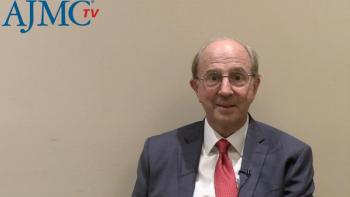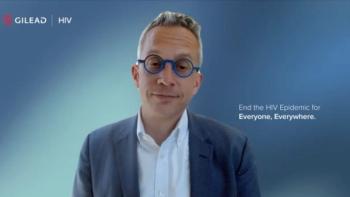
In this final segment of our interview with Ontada's Jessica K. Paulus, ScD, she explains how her team's data presented at the American Society of Clinical Oncology annual conference may translate to the real world.

In this final segment of our interview with Ontada's Jessica K. Paulus, ScD, she explains how her team's data presented at the American Society of Clinical Oncology annual conference may translate to the real world.

Jennifer Miller, MD, a pediatric endocrinologist at Lurie Children's Hospital, discusses the challenges of systemic corticosteroid use in children, such as adrenal suppression and growth delays.

Doug Fulling, MA, discussed how introducing payers into clinical research earlier could help manufacturers, payers, and patients.

The aflibercept 8 mg injection improves patient care by allowing longer intervals between treatments, explains Jose A. Martinez, MD, Austin Retina Associates.

Jessilin Quint, OD, MBA, FAAO, from Smart Eye Care, and Rebecca Petris, co-founder of the Dry Eye Foundation, spoke about their biggest takeaways from a recent dry eye survey conducted by The Harris Poll on behalf of Bausch + Lomb.



While there have been advances in screening technology, it is crucial to continue investing in emerging modalities and to ensure these advancements translate to clinical practice.

Kim Zynn, vice president of UPMC Health Plan's provider network and development relations team, shares how physicians can become LGBTQIA+ affirming providers, which is designated within the health plan.

Mark Bleackley, PhD, chief scientific officer, Incannex, details the progress of the ongoing RePOSA trial, which is assessing the safety and efficacy of IHL-42X in patients with obstructive sleep apnea (OSA).

To conclude our interview with him, Ravin Ratan, MD, MEd, of MD Anderson, explains the importance of caring for all patients and why he tries to own the process of patients feeling confident that they received the attention they deserve.

Timothy Caulfield, JD, discusses the sessions he's most looking forward to at this year's Society for Pediatric Dermatology annual meeting, including his talk on overcoming misinformation in pediatric dermatology.

The American Society for Preventive Cardiology (ASPC) 2024 Congress on CVD Prevention will take place August 2-4 in Salt Lake City, Utah.

In the final part of our interview with Joseph Mikhael, MD, MEd, FRCPC, FACP, he addresses how patients who experience an early relapse of their multiple myeloma are predisposed to worse outcomes.

In our ongoing interview with Jessica K. Paulus, ScD, Ontada, she explains potential drivers behind changing trends in care for lung cancer that may have been influenced by the COVID-19 pandemic.

Kathryn Lindley, MD, FACC, Vanderbilt University Medical Center, emphasizes the importance of bringing heart health care to patients and meeting them where they are.

Michael A. Choti, MD, MBA, Banner MD Anderson, cochaired the second annual Advancing Value-Based Oncology Care meeting and shared insights into the goals of this year's event and value-based medicine as a whole.

Michael Thorpy, MD, professor of neurology, Albert Einstein College of Medicine, discusses the hopeful future of treatment in idiopathic hypersomnia.

Sindhuja Kadambi, MD, MS, University of Rochester Medical Center, discussed in detail the unique considerations necessary for oncology care in the aging population.

Liz Kwo, MD, MBA, MPH, chief commercial officer, Everly Health, and faculty lecturer, Harvard Medical School, shares important tips on how artificial intelligence (AI) can best be implemented into value-based care.

Matthew Callister, MD, Banner Health, discusses the advantage of value-based oncology care as a platform for collaboration.

In part 2 of our interview with Suzanne Lentzsch, MD, PhD, Columbia University's College of Physicians and Surgeon, she touches on potential new therapies, important clinical considerations, and treatment challenge for relapsed/refractory multiple myeloma.

Jared Baeten, MD, PhD, discusses when lenacapavir could be available for the prevention of HIV, as well as other trials in the PURPOSE program.

In part 3 of our interview, Jessica K. Paulus, ScD, Ontada, addresses the importance of understanding data sources and their impact on clinical research.

Bimekizumab demonstrated safety and efficacy at 2 years among patients with nonradiographic axial spondyloarthritis (nr-axSpA) and ankylosing spondylitis (AS).

Charlie Borowicz, manager of trans and gender diverse health at Allegheny Health Network, shares how the program offers comprehensive patient-first care to those in the LGBTQ+ and gender diverse community.

The field of sarcoma study is getting more specific, with clinical investigations drilling down to more specific subtypes of soft tissue sarcoma for better targeted therapies.

In this interview from our coverage of the European Hematology Association 2024 Congress, Joseph Mikhael, MD, MEd, FRCPC, FACP, International Myeloma Foundation, discusses the complex principles that underlie treating multiple myeloma (MM) in the US.

Jared Baeten, MD, PhD, discusses the significance of the PURPOSE 1 trial results, which found that lenacapavir for pre-exposure prophylaxis resulted in no new infections of HIV.

On this episode of Managed Care Cast, we're talking with the author of a study published in the June 2024 issue of The American Journal of Managed Care® about how annual high-deductible insurance plans increase maternity care costs when pregnancies cross 2 calendar years.

259 Prospect Plains Rd, Bldg H
Cranbury, NJ 08512
© 2025 MJH Life Sciences®
All rights reserved.
